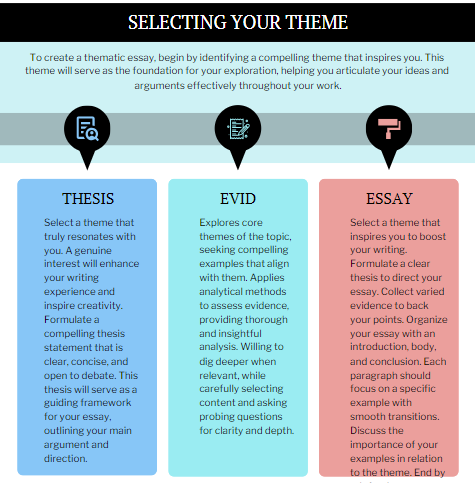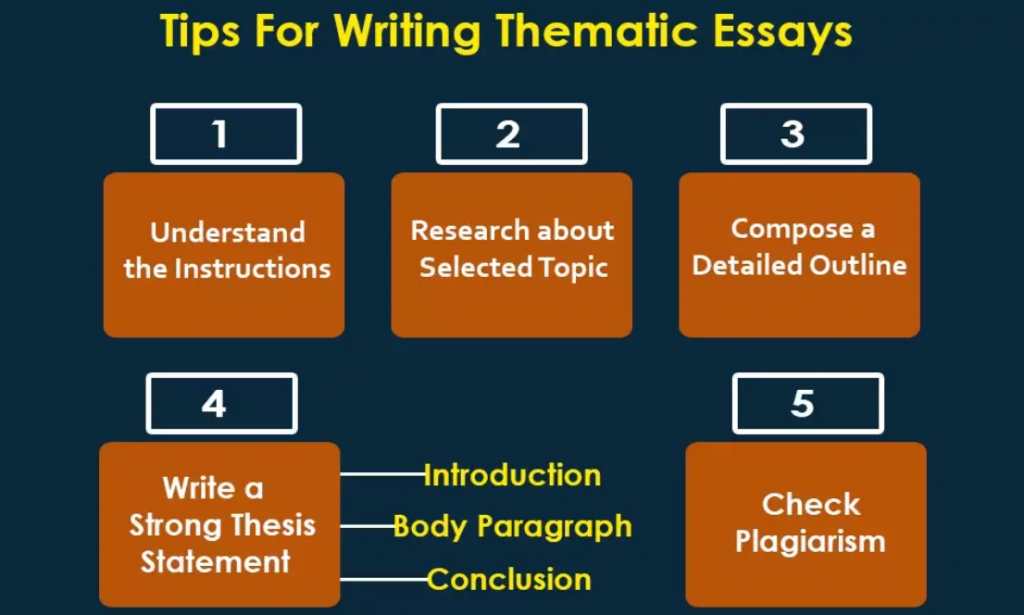The thematic essay, a staple of academic writing, invites writers to explore a complex idea through the lens of specific examples. It’s not just about summarizing facts; it’s about weaving together evidence to create a cohesive narrative that resonates with the reader. Mastering the art of the thematic essay can unlock new levels of analytical thinking and persuasive writing, making it a valuable skill for students and professionals alike.
Understanding the Foundation: What is a Thematic Essay?
At its core, a thematic essay is an argumentative piece that focuses on a unifying theme or concept. This theme can be broad, like the impact of technology on society, or more specific, like the role of female characters in Shakespearean plays. The writer’s task is to develop a well-defined thesis statement that articulates their perspective on the chosen theme and then support it with carefully selected evidence.
Beyond the Surface: The Importance of Depth and Analysis
Unlike a simple descriptive essay, the thematic essay demands more than just surface-level observations. The writer needs to dive deeper, analyzing the chosen theme through the lens of specific examples. This might involve examining historical events, literary texts, scientific discoveries, or personal experiences.
The Power of Examples: Bringing the Theme to Life
The examples chosen for a thematic essay are crucial to its effectiveness. They need to be relevant, specific, and diverse enough to support the thesis statement. Each example should be thoroughly analyzed, drawing connections back to the central theme.
Creating a Compelling Narrative: Structure and Flow
A well-structured thematic essay is a journey for the reader, guiding them through a logical progression of ideas. The introduction sets the stage, introducing the theme and outlining the essay’s main points. Each body paragraph focuses on a specific example, analyzing its significance in relation to the theme. Finally, the conclusion summarizes the key arguments and reinforces the thesis statement.

Tips for Writing a Powerful Thematic Essay
- Choose a Theme That Interests You: The first step is to select a theme that truly captivates your interest. This will make the writing process more enjoyable and result in a more engaging essay.
- Develop a Strong Thesis Statement: Your thesis statement is the heart of your thematic essay. It should be clear, concise, and debatable. It should also provide a roadmap for the essay, indicating the main points you will discuss.
- Gather Relevant Evidence: Once you have your thesis statement, start researching and gathering evidence to support your claims. Look for a variety of examples that can be effectively analyzed to demonstrate the theme’s impact.
- Structure Your Essay Logically: A well-structured thematic essay has a clear beginning, middle, and end. Each body paragraph should focus on a specific example and its connection to the theme. Transitions between paragraphs should be smooth, guiding the reader through the argument.
- Analyze Your Examples in Depth: Don’t just summarize your examples; analyze them. Explain how they connect to the theme and what insights they reveal. Show the reader why these examples are significant and how they contribute to the overall argument.
- Synthesize Your Findings: Don’t just present a series of examples; weave them together to create a cohesive narrative. Your conclusion should provide a clear synthesis of your main points, reinforcing your thesis statement and leaving the reader with a lasting impression.
Thematic Essay Examples: From Literature to Science
To better understand how to write a thematic essay, it’s helpful to explore some examples:
Example 1: Thematic Essay on Literature
- Theme: The Power of Forgiveness in Shakespearean Plays
- Thesis Statement: Shakespeare’s plays demonstrate that true forgiveness requires introspection, empathy, and a willingness to move beyond past wrongs.
- Examples:
- The relationship between Othello and Desdemona in “Othello”
- The reconciliation between King Lear and Cordelia in “King Lear”
Example: History Thematic Essay
- Theme: The Impact of the Industrial Revolution on Society
- Thesis Statement: The Industrial Revolution brought about profound social, economic, and technological changes, fundamentally transforming the way people lived and worked.
- Examples:
- The rise of factories and mass production
- The growth of cities and urbanization
- The emergence of new social classes
Thematic Essay on Science
- Theme: The Ethics of Genetic Engineering
- Thesis Statement: While genetic engineering holds tremendous potential for advancing medical science, it also raises ethical concerns that require careful consideration.
- Examples:
- The development of CRISPR-Cas9 technology and its potential applications
- The debate over the ethical implications of genetically modified organisms (GMOs)
Developing a Powerful Thematic Essay: Beyond the Basics
To elevate your thematic essay from good to great, consider these additional strategies:
- Go Beyond the Obvious: Don’t just rely on the most well-known examples. Explore lesser-known or unconventional examples to offer fresh insights and demonstrate deeper research.
- Use Figurative Language: Employ vivid language and imagery to bring your theme to life and connect with the reader on an emotional level.
- Engage with Counterarguments: Acknowledge and address counterarguments to your thesis. This demonstrates intellectual rigor and strengthens your overall argument.
- Offer a Thought-Provoking Conclusion: Instead of simply summarizing your main points, end your thematic essay with a thought-provoking conclusion that encourages further discussion or reflection on the theme.

Avoiding Common Pitfalls in Thematic Essays
The thematic essay, a staple in academic writing, demands a deep understanding of a chosen theme and the ability to weave together diverse sources to build a compelling argument. While it offers a unique platform for intellectual exploration, the structure of a thematic essay can easily lead to common pitfalls that can undermine the effectiveness of your work. Here’s a guide to recognizing and avoiding these pitfalls, enabling you to craft a powerful and well-structured thematic essay.
- The Lack of a Clear Thesis:
A strong thematic essay hinges on a well-defined thesis statement. Without a clear and concise argument, your essay will lack direction and purpose. The thesis should explicitly state the central idea of your essay, outlining the specific aspects of the theme you will explore and the conclusions you intend to draw. Avoid vague or overly broad statements, and ensure your thesis is debatable and offers a unique perspective on the theme.
- Insufficient Evidence:
A thematic essay requires substantial evidence to support your claims. Failing to provide sufficient evidence weakens your argument and leaves your reader unconvinced. Utilize a variety of sources, including historical documents, literary works, statistical data, and expert opinions, to build a convincing case. Remember, your evidence should be directly relevant to your thesis and carefully analyzed to demonstrate its connection to your argument.
- Thematic Drift:
Staying true to your theme is crucial for a successful thematic essay. A common pitfall is venturing into tangential topics or neglecting to establish a clear link between your evidence and the central theme. Regularly re-evaluate your essay’s structure, ensuring each paragraph directly relates to the overarching theme and supports your thesis statement.
- Lack of Analysis:
Merely presenting evidence is insufficient; you must analyze it to demonstrate its significance within the context of your thematic essay. Analyze your chosen sources, highlighting their strengths and weaknesses and discussing how they contribute to your overall argument. Connect the dots for your reader, explaining how each piece of evidence illuminates a particular facet of the theme and advances your thesis.
- Neglecting Counterarguments:
A robust thematic essay acknowledges and addresses potential counterarguments. Ignoring opposing viewpoints weakens your argument and suggests a lack of critical thinking. By engaging with counterarguments, you demonstrate a nuanced understanding of the theme and solidify your own position. Remember to refute these counterarguments with evidence and reasoning, further strengthening your thesis.
- Lack of Coherence and Organization:
A well-organized essay is essential for clear communication and logical flow. A thematic essay requires a structured approach, typically divided into distinct paragraphs each dedicated to a specific aspect of the theme. Employ transitional phrases and topic sentences to guide your reader through your argument and ensure smooth transitions between paragraphs.
- Missing Conclusion:
The conclusion serves as the final statement of your thematic essay, reiterating your thesis and summarizing your key arguments. It should offer a sense of closure, leaving the reader with a lasting impression of your analysis and insights. Avoid simply restating your introduction; instead, provide a final thought that expands upon your argument and leaves the reader with something to consider.
Avoiding these pitfalls will elevate your thematic essay to new heights. By crafting a clear thesis, providing sufficient evidence, maintaining thematic focus, analyzing your sources, acknowledging counterarguments, ensuring coherence, and crafting a compelling conclusion, you can create an essay that is both insightful and persuasive.

Mastering the art of the thematic essay is not just about passing a test; it’s about developing valuable analytical and communication skills. It encourages you to delve deeper into complex ideas, explore diverse perspectives, and present your arguments in a compelling and insightful way. Whether you’re writing about literature, history, science, or any other subject, the thematic essay offers a powerful tool for expressing your ideas and making a lasting impact on your readers.
Hire Professional Essay Writing Help
At Exemplary Dissertations, we offer professional thematic essay writing help to enable you get through assignments seamlessly. We have experienced writers to assist you with choosing a topic, essay writing, proofreading, editing, formatting and plagiarism removal. Besides, we also provide customized help with case studies, research papers and dissertations

